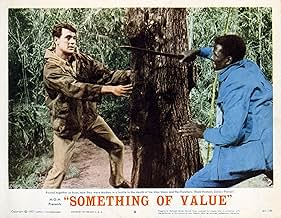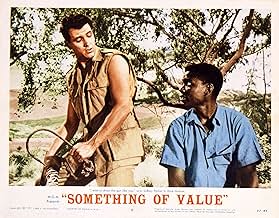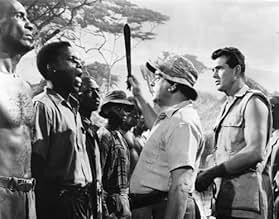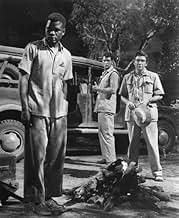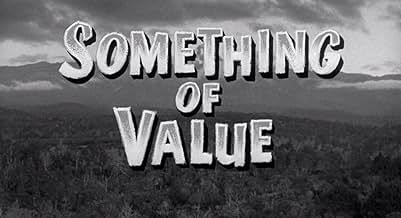Aggiungi una trama nella tua linguaIn British Colonial Kenya during the Mau Mau uprising, Peter and Kimani, who grew up together, find themselves on the opposite sides.In British Colonial Kenya during the Mau Mau uprising, Peter and Kimani, who grew up together, find themselves on the opposite sides.In British Colonial Kenya during the Mau Mau uprising, Peter and Kimani, who grew up together, find themselves on the opposite sides.
- Regia
- Sceneggiatura
- Star
- Premi
- 1 vittoria e 1 candidatura in totale
- Policeman
- (non citato nei titoli originali)
- Mwange Wife
- (non citato nei titoli originali)
- Mr. Barker - the Client
- (non citato nei titoli originali)
- Superintendent
- (non citato nei titoli originali)
Recensioni in evidenza
A strong and thoughtful drama for the historical-minded people , concerning the Mau Mau terror with nice mood , well-performed , and not for the squeamish . The tension , intrigue and suspense mantain a real grip across . In "Something of value" anyway , neither White Men , nor African people are necessarily the heroes , but both of them share the guilt of the distresses . In fact, the attitude of the colonials and the Africans are both very accurately portrayed . This is by far the best film about the Mau Mau rebellion in Kenya along with ¨Simba¨by Brian Desmond Hurst with Dick Bogarde , Donald Sinden , Virginia McKenna , this was British forerunner of Richard Brook's work. The ambient of the country at the time is pretty well shown accompanied by an atmospheric cinematography in black and white by Russell Harlan , as well as thrilling musical score by Miklos Rozsa . Being shot on location in Nairobi National Park, and Nairobi , Kenya . Cast is frankly good as Rock Hudson playing Peter who still believes that there is a chance for peaceful co-existence and that he can stop most of the killing if he can reason with Kimani nicely performed by Sidney Poitier. Excellent support cast such as Robert Beatty , Juano Hernandez , William Marshall ,Walter Fitzgerald , Michael Pate, Ivan Dixon , and Wendy Hiller as a doomed wife. the motion picture was competently directed by Richard Brooks.
Based on historical events as the Mau Mau Uprising (1952-1960), also known as the Mau Mau Rebellion, the Kenya Emergency, and the Mau Mau Revolt, was a war in the British Kenya Colony (1920-1963) between the Kenya Land and Freedom Army (KLFA), also known as Mau Mau, and the British authorities.Dominated by the Kikuyu people, Meru people and Embu people, the KLFA also comprised units of Kamba and Maasai peoples who fought against the white European colonist-settlers in Kenya, the British Army, and the local Kenya Regiment (British colonists, local auxiliary militia, and pro-British Kikuyu people).The capture of rebel leader Field Marshal Dedan Kimathi on 21 October 1956 signalled the defeat of the Mau Mau.
As children, Peter (Rock Hudson) and Kimani grow up doing everything together. But as adults, the Black East African 'boy' is fit only to carry his White East African 'bwana' friend's rifle for him, something neither of them really understands though (naturally) Peter is slightly more accepting of it. When Kimani's father (Ken Renard) is imprisoned indefinitely for following a custom deemed barbaric by the ruling class of British colonists, he runs away to join a criminal gang (led by Juano Hernandez's character) that later becomes an insurgency group dubbed Mau Mau; read your history if you're unfamiliar with the real back-story.
Predictably, Peter and Kimani will inevitably meet again on opposite sides of the law. The movie also features the comely Dana Wynter as Peter's love interest come wife; their relationship parallels that of his aunt Elizabeth (Wendy Hiller) and Uncle Jeff (Robert Beatty).
Jeff and two of their children are murdered during the Mau Mau Uprising. Walter Fitzgerald plays Peter's father, who had been a friend of Kimani's dad and whose knowledge and skills help to end the revolt.
Michael Pate plays a White settler that reflects the colonists' racism; William Marshall plays the Black leader that organizes the revolution starting with a meeting in Nairobi.
Richard Brooks directed and adapted the screenplay from Robert C. Ruark's novel of the same name.
Preceded by "Simba" an English movie starring Dirk Bogarde the screenplay of which
shows a lot of similarities with "something of value' Brooks 's work seems nevertheless superior ,because it has very strong scenes:Poitier,smashing the mirror with disgust after the killing,the informer killed on the barbed wire by the other prisoners;the old man ,afraid of thunder.This last scene may seem naive ,nay insulting for the natives ,but it was fifty years ago.People who criticize the movie should think about it:in 1957,it was a courageous movie,as "the last hunt" was.
The film moves along and is never boring. It tells a good story and is generally well acted. It's too bad that Rock Hudson didn't, or couldn't, attempt a British accent. Although it's clear that all the whites in the film are British, Hudson just moves right along with his American accent, quite un-self conscious about it all. (Maybe it's just as well; he might have ended up sounding as ridiculous as Marlon Brando in "Mutiny on the Bounty.") This is in stark contrast to Sidney Poitier, who manages an African accent quite well. Poitier is actually superb in his role; this was well before he assumed the persona of the saintly characters so superior to everyone else that he played to excess in the 60s. This film appears not to be available on video, so you'll probably have to wait until it appears on Turner Classic Movies again. 8/10
There is strong stuff in this film about the Mau-Mau insurrection in Kenya in the 1950's. It was a film I remembered vividly, especially the scenes of Mau-Mau rituals, but also for the haunting background music and for Dana Wynter who just seemed so perfect.
At the time, colonisation was ending. Britain, which had coloured so much of the globe pink, would sometimes just haul down the flag and sail away, but in some African countries with generations of white farmers and landowners, things were trickier.
That was the background to Richard Brook's film of Robert Ruark's novel.
Peter McKenzie (Rock Hudson) and Kimani (Sidney Poitier) have grown up together in Kenya, but find that their different skin colours and cultures are forcing them apart.
There is interesting information on the making of the film in "Tough as Nails: The Life and Films of Richard Brooks" by Douglas K. Daniel. Brooks and his crew went to Kenya and although some of the film was shot back in Hollywood, the location footage gave the film its authentic look. In an act not without danger, Brooks and Hudson went to a secret location to meet members of the Mau-Mau.
Brooks could be a bully and alienated cast and crew except for favourites such as Sidney Poitier whom he protected from discrimination in segregated Kenya. He was rude to Dana and harsh with Rock, but he created tension to get the reactions he wanted from the actors.
Miklos Rozsa, the epic film score maestro, came up with different music for this film. Composed mainly for chorus, sometimes male, sometimes female depending on the mood, it is a fascinating impression of African music and one of the most memorable things about the film.
"Simba", a British film about the Mau-Mau rebellion was made in 1955. Also shot in Kenya, it too featured Mau-Mau attacks on white farmers, but the whole thing seemed condescending towards the Kenyans while Brook's film is more even-handed with treachery and massacres on both sides.
Both films end with a scene of a Kenyan baby, symbolising the key to the nation's future.
Lo sapevi?
- QuizIn the film, Dana Wynter drives a Land Rover. This was filmed in Kenya, and Wynter couldn't drive the Land Rover. A British citizen who bore an uncanny resemblance to Wynter and was living and working near to the filming location, stood in for this driving scene. Her name is Eileen Cussans, who lives in West Sussex, England.
- Citazioni
A White Settler - Henry McKenzie: What in the name of Almighty God are we trying to do to these people?
Crown Consul: Preserve the law, Henry, that's all.
A White Settler - Henry McKenzie: Law? Whose law? Not theirs, surely.
Crown Consul: All men are equal before the law.
A White Settler - Henry McKenzie: Except some are more equal than others.
Crown Consul: That man is an accomplice to murder. H's admitted that.
A White Settler - Henry McKenzie: But can we make him understand it? We take away their customs, their habits, their religion. We stop their tribal dances, we stop them circumcising their women. Then we offer them our way of life, something they can't grasp. We say, "Look how clean and rich and clever we are." For the Africans... different wages, different life. We mock their wise men. Take away the authority from their fathers. What are the children going to do? They'll lose respect for their elders and fathers... and when they do, look out. maybe they'll lose respect for our white Jesus too. Turn to something else for help... It won't be to us.
Crown Consul: You understand , don't you Peter? If we don't make the African respect the Law... well, the next thing you know, he'll be wanting to rule this country.
Henry's Son - Peter: Imagine that, now.
[sarcastically says]
Henry's Son - Peter: Whatever could give him that idea?
- Curiosità sui creditiThe starting credits start with the words: "When we take away from a man his traditional way of life, his customs, his religion, we had better make certain to replace them with Something of Value!"
- ConnessioniFeatured in Rock Hudson's Home Movies (1992)
I più visti
- How long is Something of Value?Powered by Alexa
Dettagli
Botteghino
- Budget
- 2.553.000 USD (previsto)
- Tempo di esecuzione1 ora 53 minuti
- Colore
- Proporzioni
- 1.85 : 1
Contribuisci a questa pagina



